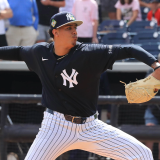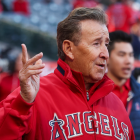MLB hot stove: Winners and losers of 2019 non-tender deadline include Marlins and Brewers
The non-tender deadline passed Monday, and as a result, 40 additional players are free agents
The 2019 tender deadline passed on Monday night, resulting in 40 additional players hitting the free-agent market after their teams elected against the potential for an arbitration hearing. To mark the occasion, we decided to name some winners and losers from the night that was.
Winner: Marlins
It's not every day the Marlins emerge as a clear winner, but they did so on Monday by adding a pair of veterans on the outs with American League East teams. The Marlins acquired second baseman Jonathan Villar in a trade with the Orioles and landed first baseman Jesus Aguilar off waivers from the Rays.
Villar has had his ups and downs over the years, and is regarded as a negative at second base and in the clubhouse. Still, he's hit .261/.322/.410 (94 OPS+) with 98 stolen bases since the start of the 2017 season. Aguilar, meanwhile, is just over a season removed from making the All-Star Game. At minimum, he should provide some insurance in case Garrett Cooper proves unable to repeat his 2019 season.
The Marlins aren't going to compete for a playoff spot in 2020 (and probably won't in 2021, either), but it's about time they spent money they didn't have to in order to improve their product.
Loser: Brewers
The belief around the league is that the Brewers have no financial flexibility. That would explain Milwaukee's aggressive approach to non-tenders. The Brewers cut ties with Jimmy Nelson, Travis Shaw, Junior Guerra, Alex Claudio and Tyler Saladino on Monday. Add in their earlier dismissals or trades of Chase Anderson, Hernan Perez and Zach Davies, and the Brewers have freed up more than $30 million just from the arbitration-eligible portion of their roster.
Unfortunately, those moves have created some holes on their roster. It'll be interesting to see how David Stearns -- who has shown himself to be an opportunistic exec -- maneuvers this winter. As it stands, he has a lot of work to do (and apparently a tight needle to thread) in order to keep the Brewers in contention.
Winner: Risk-averse contenders
As mentioned above, 40 additional players now free agents. Many of those players will sign one-year pacts for a handful of millions here and there. That's good news for teams who want to add talent without having to pay for it in the form of a multiyear or high-cost contract. Some opportunistic team could improve its roster in a hurry by picking at the non-tender class.
Loser: Athletics
Similar to the Brewers, the Athletics' roster took a hit on Monday for the sake of saving coins. The A's traded Jurickson Profar for Austin Allen (a deal that should offset cutting ties with Josh Phegley), and non-tendered Blake Treinen just a season after his dominant 2018 campaign. Treinen may never reach those heights again, but he's posted an ERA+ of 110 or better in four of his six big-league attempts and he figures to be among the more sought-after members of this non-tender class. And yet the A's will have nothing to show for his departure. Rough.
Winner: Phillies
By non-tendering both Maikel Franco and Cesar Hernandez, the Phillies have essentially ensured they'll upgrade by spending money on at least one free-agent infielder -- be it Anthony Rendon, Josh Donaldson, Didi Gregorius or whomever. As such, we're including the Phillies as a winner. It might be a stretch since it's based on an implication for the time being, but c'mon -- it's the non-tender deadline.
Loser: C.J. Cron
We'll end with Cron, who will now have to find his fourth team in four years. Cron is an adequate first baseman who has posted an OPS+ of 100 or better in five of his six big-league seasons. In a different era, he'd probably be closing in on a multiyear pact worth a nice chunk of change. Yet in this day and age he's likely to continue hopping around the league on one-year arrangements because he's essentially a league-average hitter who bats righty and plays a non-essential defensive position.


















